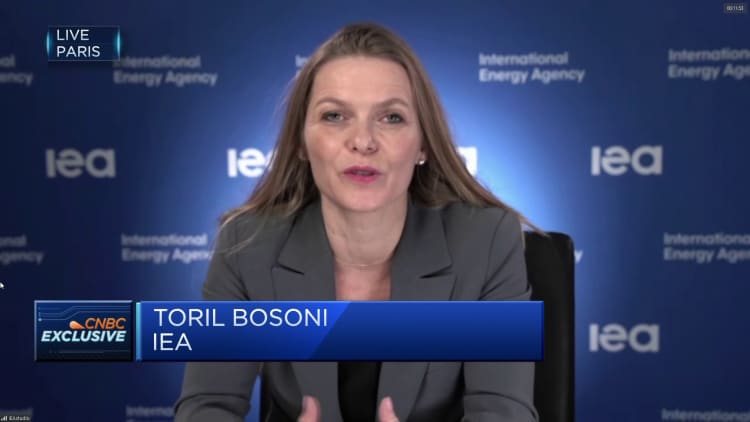Despite surprisingly robust production and exports in recent months, bans and price caps aimed at Russian oil are having the “intended effect,” according to Toril Bosoni from the International Energy Agency.
The G-7 (Group of Seven) major nations’ $60 oil price cap went into effect on December 5, while the European Union’s embargo on Russian oil products went into effect on February 5.
Bosoni, head of the IEA’s oil industry and markets division, told CNBC on Wednesday that recent Russian oil exports and production have fared “far better than predicted.” Moscow was able to redirect a significant amount of the petroleum that was previously shipped to Europe to new markets in Asia, which is why.
According to the IEA’s oil market assessment released on Wednesday, China, India, and Turkey in particular increased purchases to somewhat offset the 400,000 barrel per day decline in Russian crude supplies to Europe in January. With the Druzhba pipeline and Bulgaria, which are both immune from the EU ban, some Russian oil is still travelling to Europe.
As a result, the IEA reported that 8.2 million barrels of oil were transferred to markets around the world in January, a decrease from pre-war levels of only 160,000 barrels per day. According to the agency, the G-7 price limitations may also be supporting Russian exports to some extent because Moscow is compelled to sell its Urals oil to those nations who adhere to the caps at a lower price, perhaps making it more appealing than other suppliers of petroleum.
Bosoni noted that despite Russia’s high export volumes, the sanctions had not been effective.

“The price cap was implemented in order to maintain the flow of Russian oil to the market while also lowering Russian income. Despite Russian output entering the market, we can witness a significant decline in the amount of money Russia makes from its oil and gas “Bosoni declared.
According to her, Russia’s export earnings in January were roughly $13 billion, a 36% decrease from the same month last year. “In that respect, we can say that the price cap is having its intended impact.” “Russian fiscal receipts from the oil industry are down 48% in the year.”
She also emphasised the widening gap between Brent crude and worldwide benchmark Urals crude prices. According to the Russian Finance Ministry, the former averaged $49.48 a barrel in January, whilst Brent was trading above $85 per barrel on Thursday.
Crucially, Russia’s 2023 budget is predicated on an average Urals price of $70.10/bbl, thus the country’s public finances are being left with a sizable hole as oil revenues continue to decline year over year.
Bosoni added that the IEA anticipates exports and production to decline even lower in the upcoming months since it appears Moscow may not be able to reallocate the trade of oil products in the same way it has done with crude exports.
We are currently observing some reallocation of trade in goods, but we haven’t observed the same change as we did for crude, which is why we anticipate a decline in Russian exports and output.
Reduced Output
In reaction to the most recent wave of Western sanctions, Russia declared last week that it would reduce production by 500,000 barrels per day in March, or around 5% of its most recent oil output.
Bosoni asserted that this was in line with IEA predictions.
“This is reflected in our balances that still show the markets reasonably well supplied through the first half of the year, so we’re not too concerned about this reduction, we think there’s enough supply to fulfil demand for the next months,” she said.
“The question will be when summer comes around, refinery activity picks up to meet summer driving and China bounce really takes off, this is when we can see the market tighten substantially through the rest of the year.”
In its report, the IEA suggested the production cut may be less about retaliation and more an attempt by Mosco.
The IEA noted in its analysis that the production reduction may be less about retaliation and more an effort by Moscow to support prices by reducing output rather than continuing to sell at a significant discount to nations adhering to the G-7 price limitations.
Global Demand for Oil
After a significant slowdown in the second half of 2022, global oil demand growth is anticipated to speed up in 2023, with China accounting for a sizable percentage of the anticipated increase.
According to the IEA, a noticeable increase in air traffic in recent weeks has highlighted the crucial role that jet fuel deliveries will play in growth in 2023. Throughout the course of 2023, oil deliveries are anticipated to increase by 1.1 million barrels per day to reach 7.2 million barrels per day, with overall demand reaching a record 101.9 million barrels per day.
In order to satisfy that demand rise, the IEA research warned that the consequences of the West’s most recent oil embargo and price cap will be crucial.
“Beijing’s position on domestic refinery operations and product exports will also change once the facility reopens. To meet the rising demand for refined products, new refineries are anticipated to open in China, Africa, and the Middle East “It read.
“Product markets may probably survive the storm if the price ceiling on goods is half as successful as the crude cap, but more crude supplies would be required to prevent fresh stock withdrawals later in the year.”



An intriguing discussion is definitely worth comment. I think that you need to publish more about this topic, it may not be a taboo subject but typically folks dont discuss these issues. To the next! Best wishes!!
Nice post. I learn something totally new and challenging on sites I stumbleupon everyday. It will always be exciting to read content from other writers and practice a little something from other sites.
Very good post. I absolutely appreciate this site. Thanks!
I was very pleased to uncover this great site. I want to to thank you for ones time due to this fantastic read!! I definitely savored every little bit of it and i also have you saved to fav to see new stuff in your site.
Im very pleased to find this page. I wanted to thank you for ones time just for this wonderful read!! I definitely really liked every bit of it and i also have you book-marked to check out new things on your blog.
Right here is the perfect webpage for anybody who wishes to find out about this topic. You realize so much its almost hard to argue with you (not that I actually will need toÖHaHa). You definitely put a new spin on a topic which has been discussed for many years. Great stuff, just excellent!
The very next time I read a blog, I hope that it wont disappoint me just as much as this one. I mean, I know it was my choice to read through, but I genuinely believed you would probably have something useful to say. All I hear is a bunch of complaining about something you could fix if you werent too busy searching for attention.
I would like to thank you for the efforts youve put in writing this blog. I am hoping to see the same high-grade content by you later on as well. In fact, your creative writing abilities has motivated me to get my own website now 😉
awesome